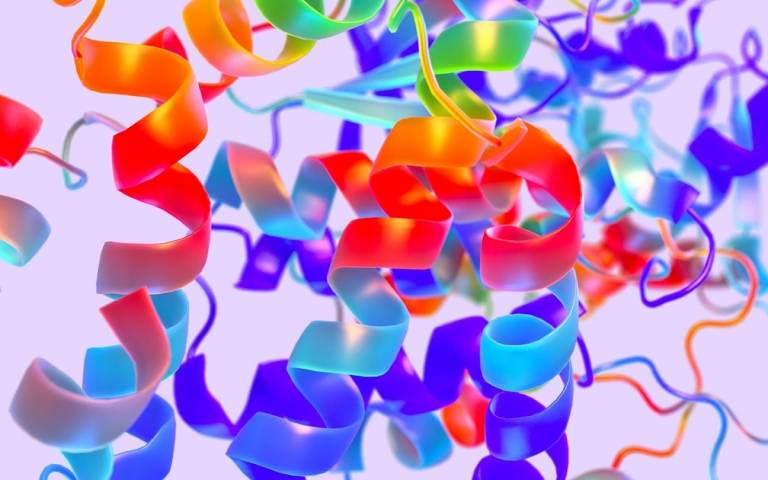创新背景
我们身体的几乎所有功能都依赖于蛋白质。预测蛋白质复杂的三维结构是很重要的,因为它的结构在很大程度上决定了它的功能,一旦知道了这种结构,科学家就可以开发针对这种独特形状的药物。蛋白质结构可以通过实验来确定,使用冷冻电子显微镜、核磁共振和x射线晶体学等技术,但这些技术极其昂贵和耗时。
创新过程
这项发表在《自然》杂志上的新研究发现,一个名为AlphaFold的深度学习系统可以从头开始建模蛋白质结构——也就是说,只基于基因序列——比以往任何建模系统都要好,并且与利用先前解决的蛋白质模板的系统具有相似的精度。
大卫·琼斯教授(伦敦大学学院计算机科学学院)是伦敦大学学院生物信息学小组的负责人,也是这项研究的合著者,他说:“蛋白质的3D结构可能是科学家能够获得的最有用的信息,有助于理解蛋白质的功能以及它在细胞中如何工作。确定蛋白质结构的实验技术既耗时又昂贵,因此需要更好的计算机算法来直接从编码蛋白质的基因序列计算蛋白质的结构,DeepMind将人工智能应用于分子生物学中这个长期存在的问题的工作无疑是一个进步。最终目标之一将是确定每一种人类蛋白质的精确结构,这可能最终导致分子医学的新发现。”

DeepMind的研究科学家、该研究的主要作者安德鲁·希尔恩博士说:“蛋白质结构预测是一个极其困难的问题,我们的工作建立在该领域专家几十年的进步的基础上。尽管在实现持续准确的蛋白质预测之前,我们还有很多工作要做,但我们对这一进步感到兴奋。”
该研究团队训练了一个深度神经网络——松散地以人脑为模型的一系列算法,旨在识别非结构化数据中的模式——来预测蛋白质结构的两个特定属性:成对氨基酸之间的距离和连接这些氨基酸的化学键之间的角度。另一个神经网络预测了蛋白质中氨基酸残基之间的距离分布。

然后训练第三组算法来估计提出的蛋白质结构与正确答案的接近程度。研究人员确定了符合他们预测的蛋白质,然后用算法在蛋白质结构中发明新的蛋白质片段,以接近可能的结构。
最后,采用梯度下降的数学方法来提高预测结构的准确性。
创新价值
到目前为止,人类体内只有大约一半的蛋白质被绘制出来。人们希望能够快速而经济地绘制出蛋白质的结构,这可能有助于理解疾病和发现新的治疗方法。
创新关键点
该研究团队训练了一个深度神经网络——松散地以人脑为模型的一系列算法,旨在识别非结构化数据中的模式——来预测蛋白质结构的两个特定属性:成对氨基酸之间的距离和连接这些氨基酸的化学键之间的角度。
创新主体
伦敦大学学院(University College London,简称:UCL ),1826年创立于英国伦敦,是一所公立研究型大学,为伦敦大学联盟的创校学院、罗素大学集团和欧洲研究型大学联盟创始成员,被誉为金三角名校和“G5超级精英大学”之一。
UCL是伦敦的第一所大学,以其多元的学科设置著称,于REF 2014 英国大学官方排名中,位列全英之冠,享有最多的科研经费。UCL的医学、解剖学和生理学、建筑学、教育学、考古学、计算机科学、计算金融学等学科排名均位居世界前列,与LSE并称为“英国现代经济学研究的双子星”;其人文学院颁发的奥威尔奖则是政治写作界的最高荣誉。
Using artificial intelligence to predict protein 3D structure
The new study, published in Nature, found that a deep learning system called AlphaFold can model protein structures from scratch - that is, based only on gene sequences - better than any previous modeling system and with similar accuracy to systems that utilize previously solved protein templates.
Professor David Jones (school of computer science at university college London) is in charge of the bioinformatics group at university college London, is also a co-author of the study, he said: "the 3 d structure of the protein may be scientists were able to get the most useful information, help to understand the function of the protein and its work in the cell. Experimental techniques for determining protein structures are time-consuming and expensive, so better computer algorithms are needed to calculate protein structures directly from the gene sequences that encode them, and DeepMind's work on applying artificial intelligence to this long-standing problem in molecular biology is certainly a step forward. One of the ultimate goals will be to determine the precise structure of each human protein, which may ultimately lead to new discoveries in molecular medicine."
Dr Andrew Hillen, a research scientist at DeepMind and lead author of the study, said: "Protein structure prediction is an extremely difficult problem and our work builds on decades of progress made by experts in the field. Although we still have a lot of work to do before we can achieve consistently accurate protein prediction, we are excited about this advance."
The research team trained a deep neural network -- a series of algorithms loosely modeled on the human brain and designed to identify patterns in unstructured data -- to predict two specific properties of protein structure: the distance between pairs of amino acids and the Angle between the chemical bonds that connect them. Another neural network predicts the distribution of distances between amino acid residues in a protein.
A third set of algorithms is then trained to estimate how close the proposed protein structure is to the correct answer. The researchers identify proteins that fit their predictions, and then use algorithms to invent new protein fragments within the protein structure to approximate the likely structure.
Finally, the mathematical method of gradient descent is used to improve the accuracy of structure prediction.
智能推荐
AI+癌症治疗 | 以色列理工学院开发智能工具治疗癌症
2022-09-02通过测量肿瘤突变负担和RNA分子,创新使用机器学习算法开发匹配癌症患者状况的免疫治疗方案。
涉及学科涉及领域研究方向人工智能通过图片识别皮肤病,减少误诊及医疗成本
2022-08-05研究人员设计了一款通过图像识别和管理常见皮肤病的应用程序,防止因误诊或拖延而加重病情,同时帮助卫生组织减少因不必要的复诊、无效的处方和不必要的转诊造成的医疗成本。
涉及学科涉及领域研究方向新技术+基础设施 | 主动维修基础设施,提高维修管理效率
2022-08-17利用现代数字化技术帮助精简基础设施维修措施并进行主动预防性维护,降低维修成本,提高维修效率,进而优化公共事业管理、城市管理和工程管理模式。
涉及学科涉及领域研究方向AI+能源化学 | 利用人工智能准确预测锂离子电池使用寿命
2022-08-18科学家们发现了如何准确预测锂离子电池的有效寿命,这一进展可能会加速电池的开发并改善制造。
涉及学科涉及领域研究方向